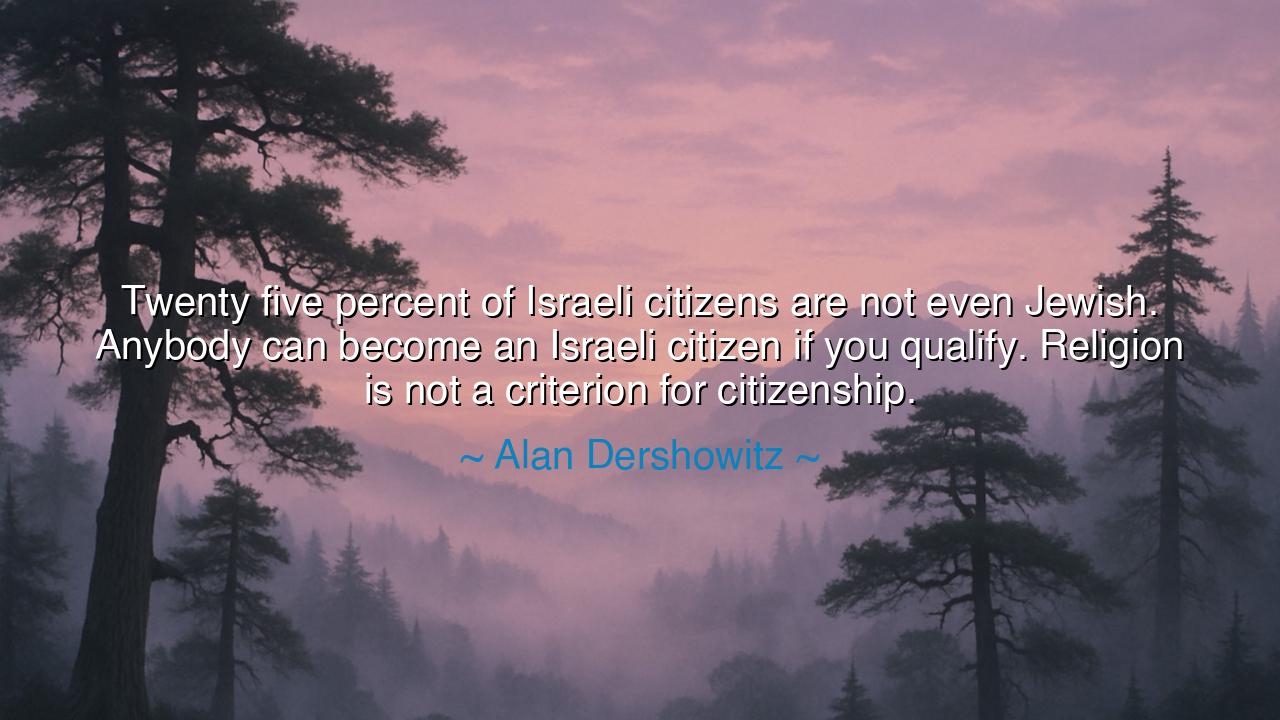
Twenty five percent of Israeli citizens are not even Jewish.
Twenty five percent of Israeli citizens are not even Jewish. Anybody can become an Israeli citizen if you qualify. Religion is not a criterion for citizenship.






Alan Dershowitz, advocate of justice and defender of law, spoke with clarity when he declared: “Twenty five percent of Israeli citizens are not even Jewish. Anybody can become an Israeli citizen if you qualify. Religion is not a criterion for citizenship.” In these words, he shatters a common misconception—that the state of Israel, though rooted in the history of the Jewish people, demands religious conformity for belonging. Instead, he reminds us that citizenship is a matter not of faith, but of law, of qualification, of the shared responsibilities of a nation.
The ancients also wrestled with the meaning of citizenship. In Athens, it was reserved only for freeborn men of Athenian descent, excluding slaves, women, and foreigners. In Rome, however, the idea expanded. Over time, even those who were not Roman by blood could earn citizenship by service, loyalty, or law. Rome’s greatness lay in this expansion, for it wove together diverse peoples under a single civic identity. Dershowitz’s words echo this ancient wisdom: that the strength of a nation lies not in narrow exclusion, but in its ability to bind many under one rule of law.
Consider the modern story of Israel, a nation born out of the ashes of persecution and the longing for a homeland. It was created primarily as a refuge for Jews, yet from its beginning it has included within its borders people of other faiths—Muslims, Christians, Druze, and others. Though conflicts remain, the principle remains true: religion is not a criterion for citizenship. This truth matters, for it reflects a vision of statehood not founded upon belief alone, but upon laws, rights, and duties shared by all.
This idea stands as a rebuke to sectarianism, the poison that has divided so many lands. When religion becomes the gatekeeper of belonging, minorities are cast out, suspicion grows, and unity dissolves. History offers grim examples: the Spanish expulsion of Jews in 1492, the wars of religion that ravaged Europe, the oppression of minorities in countless empires. Each time, exclusion in the name of faith weakened nations and deepened wounds. By contrast, a society that separates citizenship from religious identity lays the groundwork for peace, dignity, and shared progress.
And yet, Dershowitz’s words carry a deeper challenge. It is not enough to proclaim equality under the law; a nation must also live it. To say religion is not a criterion for citizenship is a principle that demands vigilance, courage, and justice. For human hearts often cling to divisions, and only by constant labor can a society ensure that minorities truly feel valued and protected. Thus, the quote is not only a statement of fact, but a call to uphold that fact in practice.
The meaning of the quote is therefore both legal and moral. Legally, it teaches that the bond of citizenship is civic, not theological. Morally, it teaches that the strength of a nation lies in its inclusivity, in its willingness to see beyond creed and to embrace the shared humanity of all its members. It is a principle that points forward, toward a vision of nations built not on exclusion, but on justice.
The lesson for us is clear: if you would build a lasting community, do not demand sameness of belief. Build instead upon fairness, upon equal law, upon respect for diversity. Citizenship must be rooted in shared duty and mutual protection, not in sectarian boundaries. For when a nation honors all its people equally, it flourishes; when it excludes, it corrodes from within.
Practical actions follow. In your own community, resist the urge to divide by religion, race, or creed. Defend the rights of minorities. Support leaders and policies that ensure equality before the law. And when you speak of belonging, let it not be bound by faith alone, but by shared humanity.
O seeker, remember Alan Dershowitz’s wisdom: religion is not a criterion for citizenship. Nations rise when they welcome, but they fall when they exclude. Therefore, choose inclusion, defend justice, and honor the dignity of all who dwell within your land. For in such unity lies not only survival, but greatness.






AAdministratorAdministrator
Welcome, honored guests. Please leave a comment, we will respond soon